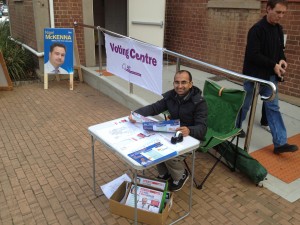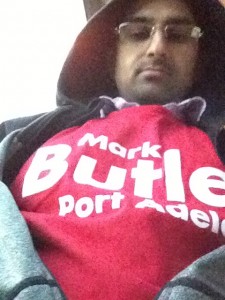Experiences from Australian elections

It was just a month I arrived in Australia when federal elections were held in 2010. It largely went unnoticed for me though I quickly managed to observe the bargaining balance in parliament by Julia Gillard to form the government.
2013 is a year that gave greater opportunity for me and Bhutanese people to learn more about Australian politics and voting system. First time in life, nearly 250 Bhutanese in South Australia exercised their adult franchise, if all eligible voted, to choose the best leader to govern them.
Learning about political culture, democratic process and party blame-game are always my hobbies. I was not a voter, not a member of any political parties yet I wished to keep myself engaged in this big show to learn how it actually operates. Above all, it was very precise time I learn about democratic system that is not essentially corrugated as in South Asia. Partly because, as I assume, the Australian democracy is introduced and practised by the British migrants who are regarded as the founders of modern democratic system and posses mature views and behaviours.
I offered my volunteering works to both Liberal and Labour, through an email. Labour’s office in Port Adelaide (seat held by Mark Butler) was quick enough to catch me for the party campaign. Initially, I would be invited to do some volunteering in rallies managements or distributing brochures and pamphlets to the pedestrians. That’s what saw about elections in Nepal, where I grew up.
That’s not. I was invited to neither event. I could not entertain myself with demonstrations, rallies and big public speeches. As I compared the politics back in Nepal or India, where ground starts boiling almost six months before the elections, Australian elections went without notice. All election campaigns were through media – the clubs host political debates and televisions broadcast them live.
I was invited to stand outside an early voting booth and guide the voters. The only symbol of campaign I was doing is wearing T-shirt where ‘Mark Butler for Port Adelaide’ was printed. The voting started almost three weeks before the actual polls day. People have choice to cast votes on their free time – though voting is compulsory violation of which results in monetary fine. The booths are open even on weekend.
The voters neither have to carry voter’s card or any other identity cards. The polling officials ask only name and address of the voters to find out in the electoral roll. No marks are awarded like in Asia to ensure the person does not return again to vote.
As I stand near the booth, I talked to Liberal volunteer, that if I voted in someone’s name?
“I don’t think Australians are so dishonest and corrupt”, he said.
In fact, sincerity is what I see in Australians as the top priority. It is self-discipline. You don’t to tell someone not to litter on road, spit on street, throw away bubble gum on park bench or pluck flowers as they walk though your garden. The self-disciple and sincerity to self. I found this profound sincerity in voting system as well. I wonder when we South Asians will learn their behaviour.
Polls day had busy schedule for me. I was in a booth since 12 PM handing them over the ‘How to Vote’ posters on behalf of Labour. It was a tiresome day, standing alongside the voters’ queue distributing the paper for six hours continuously. However, by 3 PM the booth was almost deserted. I was astonished to see how fast the process conducted. Though the voters had to number every candidate (six in House of Representatives and 73 for Senate – though senate paper had option to number only 1 party or candidate) on the ballot paper in preferential system.
The booth closed exactly at 6. No voters are entertained after that. The gated was locked. I was to represent Butler as scrutineer at the vote counting. I assumed every party would send scrutineers. But I was alone.
 The counting begun 15 minutes after the door closed. The most tedious job for the elections officials. The green ballot (for House of Representatives) was small and quite easy to count. The counting finished by 9:15 PM. I reported the result to the Butler office and head off home. The officials were still opening boxes of senate ballot paper – that was more than 1m long.
The counting begun 15 minutes after the door closed. The most tedious job for the elections officials. The green ballot (for House of Representatives) was small and quite easy to count. The counting finished by 9:15 PM. I reported the result to the Butler office and head off home. The officials were still opening boxes of senate ballot paper – that was more than 1m long.
By the time I left booth, the results had started coming out. The ruling Labour party was badly defeated, but not to the level it was expected by the media. All newspapers and TV news early morning on polls day had predicted victory for opposition Tony Abbot. That became reality by 10 PM.
Results of the election are matter of concern for leaders but the process was matter of learning for me. Sincerity, soberness, calm, peaceful and intellectual debates – that’s what I humbly realised my countrymen and the whole of South Asia must learn. It does not matter who comes to power because political philosophy is not instrument for development. It is the sincerity, dedication and commitments on part of the elected members to endeavour themselves for nation’s development and people’s welfare.
Possibly, if luck favoured me, I wish to engage myself more into the democratic process when I become voter in next elections.